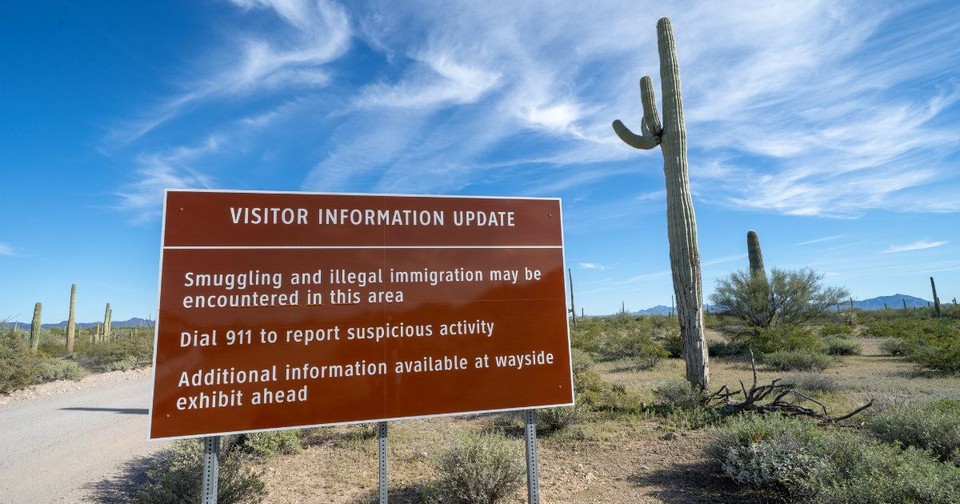How Should Christians Respond to Illegal Immigration?

This article is adapted from the eBook, Thinking Biblically about Immigrants and Immigration Reform from the Evangelical Immigration Table. Click here for your free copy.
For many Christians, the general idea that churches and individual Christians should seek to love, welcome and share the gospel with immigrants is uncontroversial, but the issue becomes much more difficult when considering how to respond to immigrants who are in the country illegally.
While most immigrants are in compliance with U.S. law, a significant minority — likely somewhere between 10.7 million and 12 million, based on nonpartisan and governmental estimates — are not present in the United States lawfully. Just over half of those individuals crossed a border illegally, while an estimated 4.5 million (including two-thirds of those who have arrived since 2014) entered lawfully on temporary visas, but overstayed their visas (Robert Warren and Donald Kerwin, “The 2,000 Mile Wall in Search of a Purpose: Since 2007 Visa Overstayers Have Outnumbered Undocumented Border Crossers by Half a Million,” Journal on Migration and Human Security, 2017).
Is it Possible to be Compassionate and Still Uphold the Law?
Christians seeking to be faithful to the Scriptures want to show kindness and compassion to these individuals but are also are bound to respect the law. Is it possible to do both?
Some people’s response to this challenge has been to advocate for “amnesty.” People mean different things by that term, but amnesty is a general forgiveness of an offense; it comes from the same root word as amnesia, forgetting that the law was violated in the first place. In the context of addressing the millions of immigrants in the U.S. today without legal status, it would basically mean pretending that their violation of law had not happened and offering them citizenship.
Christians Should Not Condone Violation of the Law
Christians can and should understand the complex reasons that people have violated immigration laws, whether they did so by crossing the border without documents or overstaying a temporary visa. But we should not condone the violation of law, because this causes the law to lose its meaning. Scripture makes clear that the rule of law is important: Romans 13 states that God has ordained government, and that every person “should be subject to the governing authorities” which God has ordained. Importantly, this chapter goes on to explain the appropriate role of government: serving the common good, maintaining order and punishing wrongdoing (Romans 13:1-4).
Christians Should Acknowledge Our Laws Need Reform
Romans 13 does not signify that every government or every law is necessarily good. There are clear examples in the Bible when laws were not good, such as when Shadrach, Meshach and Abednego were told to worship an idol (Daniel 3:1-7), when the Hebrew midwives were told to kill newborn boys (Exodus 1:15-17) or even when the Roman government condemned Jesus to crucifixion (Matthew 27:11-26). The Apostle Peter rightly observed that “We must obey God rather than human beings” (Acts 5:29).
While our immigration system isn’t as unjust as Nebuchadnezzar's decree about idol worship, most Americans across a broad range of political perspectives agree that our immigration policies are not functioning well and are in desperate need of reform. In a democratic form of government, where government is of, by and for the people, part of being “subject to the governing authorities” means actively involving ourselves in efforts to change laws that are unjust or even simply not functioning optimally.
We Need an Immigration Policy That Is Both Nimble but also Truly Enforceable
For one thing, our current immigration system makes it very difficult for all players to honor the rule of law at the same time. For decades, our government has often looked the other way as both immigrants in search of economic opportunity and employers in search of adequate labor have broken the law. In order to restore the rule of law, we need an immigration policy that is both nimble and truly enforceable, with a number of visas that is consistent with the needs of the U.S. labor market as well as with American values of keeping families together and of providing refuge to the persecuted.
Undocumented immigrants often choose to come to the U.S. illegally under very difficult circumstances, fleeing serious economic hardship or even persecution. However, except for those brought as minors or trafficked to the U.S. against their will, they still did knowingly break U.S. law. This is why amnesty is wrong: Amnesty communicates that the law doesn’t matter. Even when laws don’t work well, they shouldn’t simply be ignored — participants in a democratic society should work to change them.
Working to Ensure the Integrity of the Immigration System Moving Forward
The best way forward — both to respect the law and to keep families together — is to have an earned legalization process, which includes the payment of a monetary fine as restitution for adults who willfully violated U.S. immigration laws. Of course, a criminal background check should also be a part of that process, and anyone convicted of a serious crime should be excluded and potentially deported. On the other hand, someone brought as a child to the U.S. did not make the decision to enter the country or overstay a visa unlawfully, and should not be penalized.
Most of the undocumented immigrants in U.S. churches are actually very eager to make things right, and they would be happy to pay a fine and meet other qualifications to eventually have the chance to be lawful permanent residents of the United States, a country most have come to love and see as their home. For many who have lived under both the fear and shame associated with their unlawful status for many years, the opportunity to earn legal status would feel akin to the biblical Year of Jubilee, a time of redemption, when debts were canceled (Leviticus 25:8-17).
If the law is truly to be respected, we should ensure the integrity of the U.S. immigration system going forward: That means doing everything possible to deter illegal immigration, including pursuing secure borders, but also facilitating legal immigration: not without limit, but in ways that meet the needs of the U.S. labor market, that keep families together and that allow the country to continue to serve as a place of refuge for some of the most vulnerable persecuted people in the world, consistent with the best of the history and values of the United States.
Finally, Christians Should Give Special Consideration to Those Fleeing Persecution
Another area where respecting the rule of law comes into play is honoring the nation’s laws that offer asylum to those who flee a well-founded fear of persecution in their country of origin. Decades ago, the U.S. actually turned away Jewish people fleeing the Nazi government in Germany. Many of them were ultimately returned and killed in the Holocaust (Bauman, Soerens and Smeir, Seeking Refuge, 167). In the years that followed, the U.S. joined many other nations in resolving that, when someone with a credible fear of being harmed reaches its shores or borders, that person should not be returned. That doesn’t mean that everyone who shows up should be admitted, but if we respect both the law and the dignity of each human person, it’s vital that everyone who professes a fear of persecution if returned is given a fair hearing and the chance to prove that qualification under the terms of U.S. law.
U.S. immigration laws are complicated, dated and often only partially enforced. To restore the rule of law, we must pursue reforms that reaffirm the importance of the law while also reflecting our values.
Publication Date: July 30, 2019
Image Credit: ©GettyImages_Melissa-Kopka
For more on this subject from the Evangelical Immigration Table, check out:
WHAT DOES THE BIBLE SAY ABOUT IMMIGRATION?
THE GREAT COMMANDMENT: APPLYING THE BIBLE TO CARING FOR REFUGEES AND IMMIGRANTS?
HOW IMMIGRANTS FIT INTO THE BODY OF CHRIST AND THE LOCAL CHURCH
"GO AND MAKE DISCIPLES" - DOES THE GREAT COMMISSION APPLY TO IMMIGRATION?
HOW TO RESPECT THE GOD-GIVEN DIGNITY OF EVERY IMMIGRANT
WHY GOD WANTS US TO PROTECT THE FAMILY UNIT OF IMMIGRANTS AND REFUGEES
HOW SHOULD CHRISTIANS RESPOND TO ILLEGAL IMMIGRATION?
WHAT DOES THE BIBLE SAY ABOUT BORDER SECURITY AND SHOULD CHRISTIANS SUPPORT THEM?
The Evangelical Immigration Table is a place where evangelical Christians of various denominations, theological traditions, ethnicities and political perspectives gather together, just as in the Bible the table represents hospitality and is the place where believers come together, united by Christ. The Evangelical Immigration Table exists to encourage distinctly biblical thinking about issues of immigration, providing discipleship resources focused on immigration from a biblical and missional perspective as well as advocating for public policies consistent with biblical values, specifically restitution based immigration reform.
Originally published August 12, 2019.







